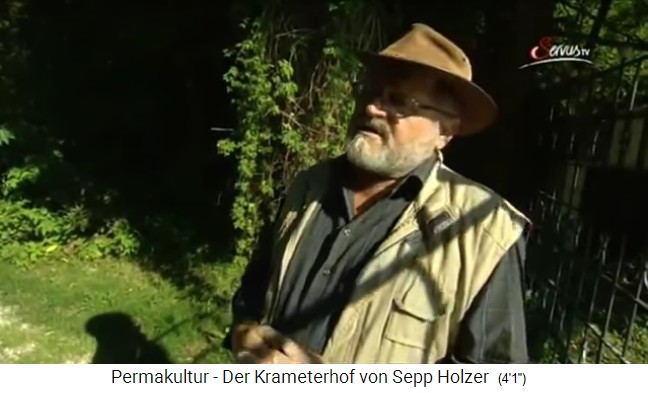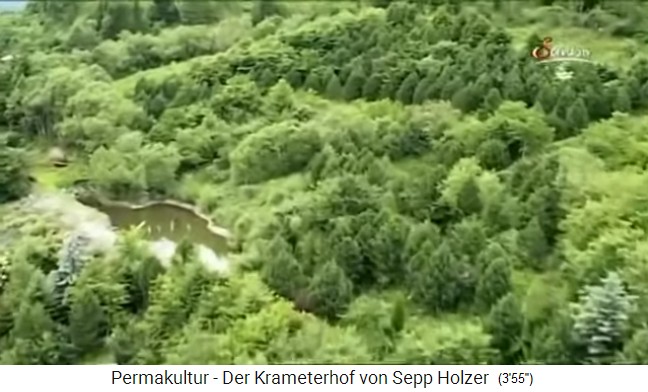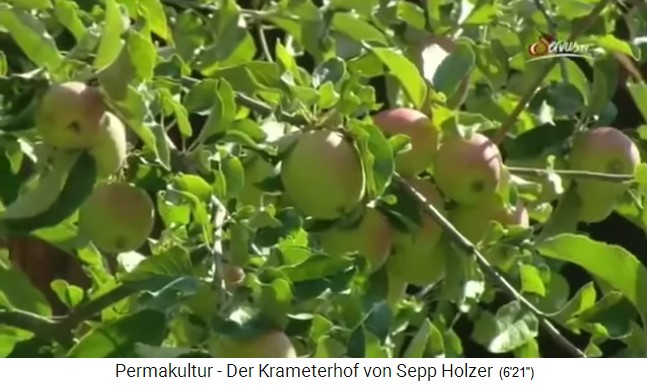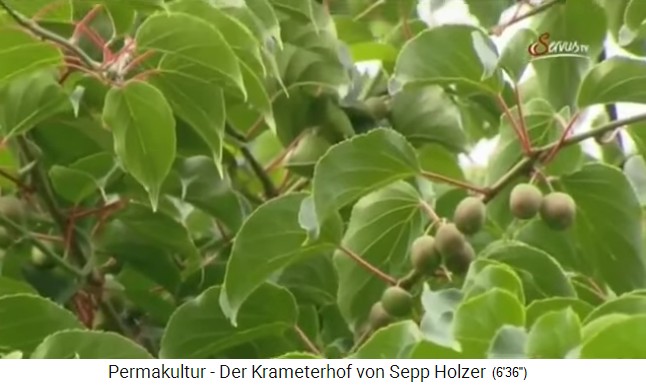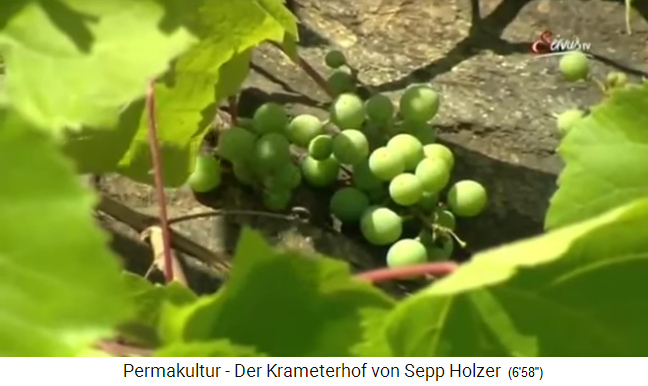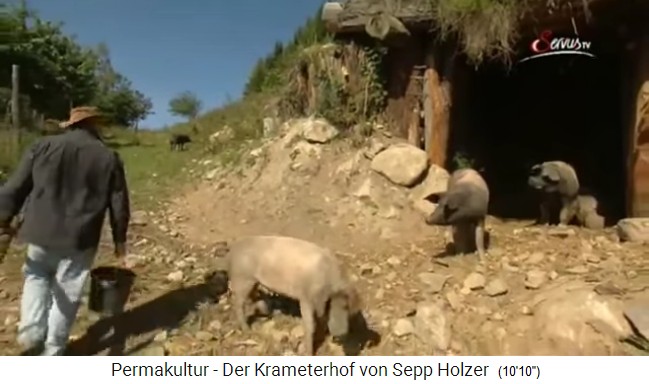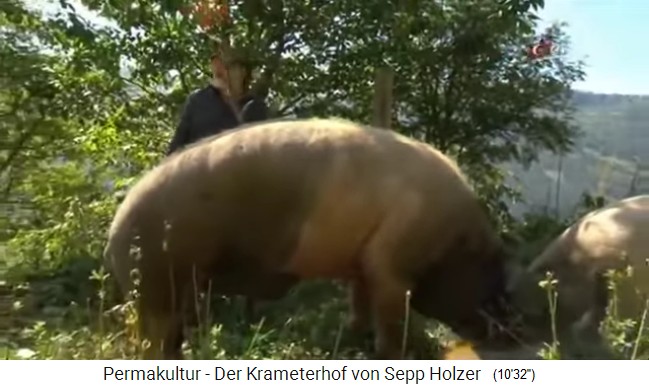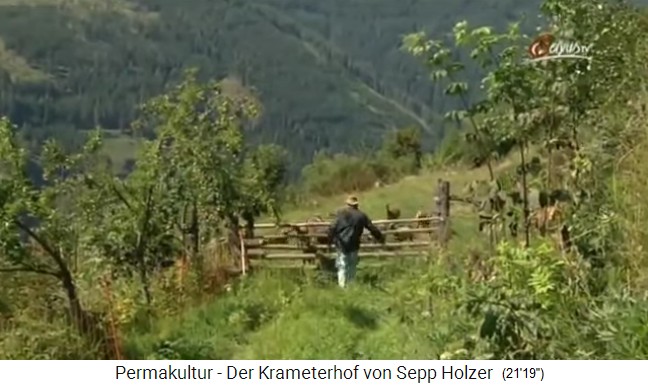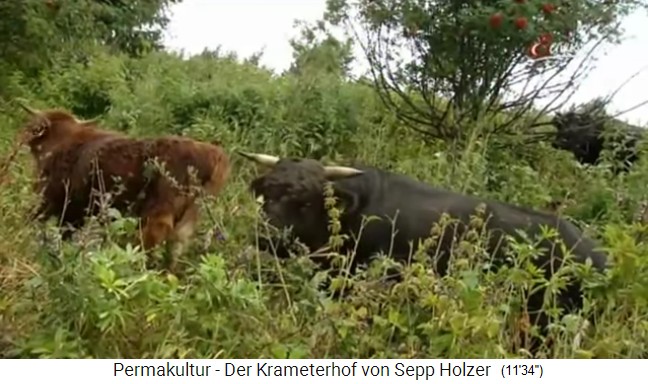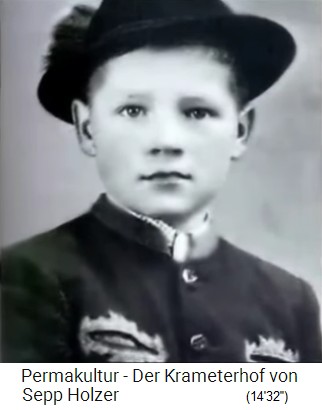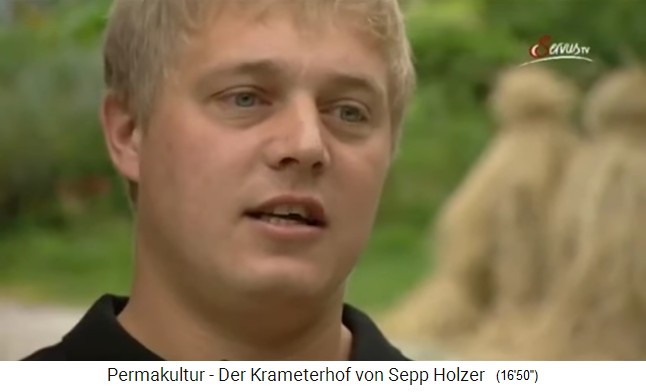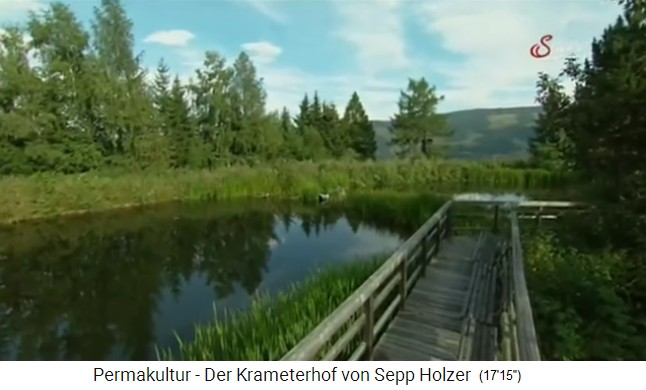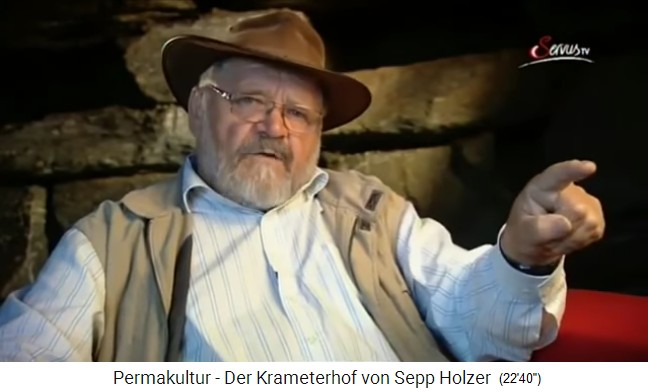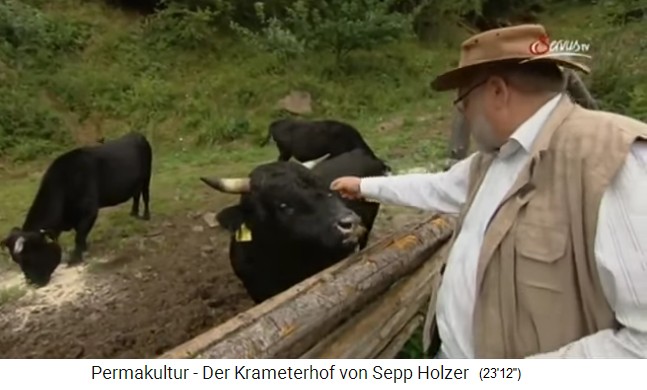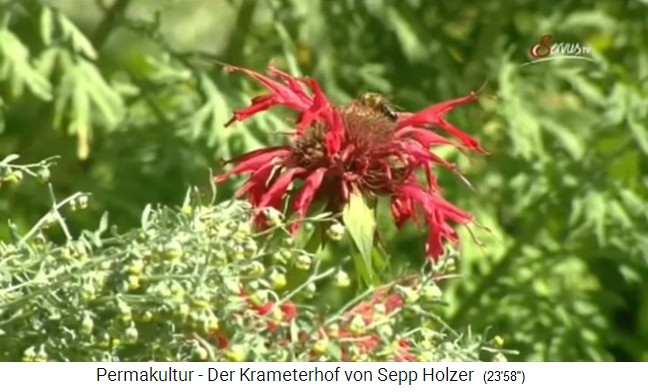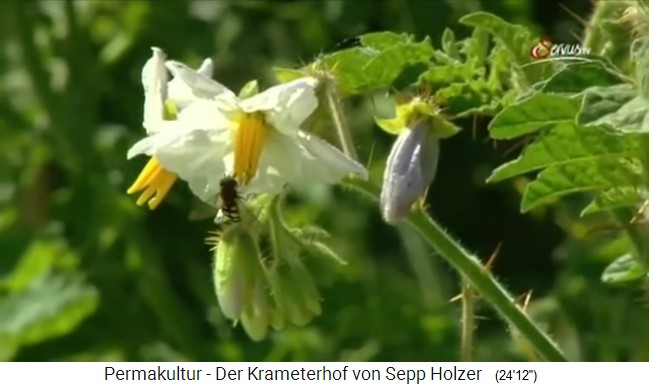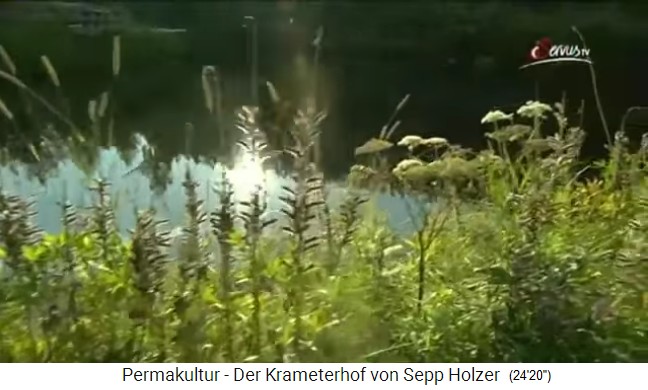D - ESP
<< >>
Bio permaculture 04d1: Sepp Holzer with his farm
Krameterhof in Ramingstein (Salzburg Alps - Austria)
Mountain climate in the Salzburg Alps between 1100 and 1500m above sea level - 40 years of experiments - Permaculture and stubborn Austrian authorities - details about Sepp Holzers agriculture: The creation of a new landscape - then minimal effort - medicinal plants + hillbeds - pigs plow the fields - cleverly combined mixed cultures save pesticides, etc. - books "The Agrarian Rebel" (2002) - "Sepp Holzer's Permaculture" (2004) - "Desert or paradise" (2013)


The farm Krameterhof of permaculture pioneer Sepp Holzer in Ramingstein near Salzburg in Austria [1] - Krameterhof, shield - Sepp Holzer in 2013 appr.
by Michael Palomino (2018)
| Share: |
Facebook |
|
Twitter
X
|
Here are some great pioneers - in terms of organic farming with permaculture - almost NO machines, NO pesticides, almost NO irrigation, with FOREST GARDEN:
Transforming a farm - example Sepp Holzer at his farm Krameterhof in Austria

The farm Krameterhof of permaculture pioneer Sepp Holzer at Ramingstein near Salzburg in Austria [1] - map 01: Austria with Salzburg and Ramingstein [2]
KrameterhofKeusching 13,Web site: www.krameterhof.at
5591 Ramingstein,
Austria
TEL + FAX 0043 6475 239
E-MAIL office@krameterhof.at
On this farm Krameterhof there are always workshops and events - Link.
First there was a big movie "Sepp Holzer - the agrarian rebell" in 2001, and then two books followed in 2002 and 2004 - and in 2013 the book was presented how to convert deserts into blooming landscapes:
-- Movie of 2001 on DVD "The agrarian rebell. Permaculture in the Salzburg Alps" (original German: "Der Agrarrebell. Permakultur in den Salzburger Alpen") (2001) - Amazon-Link
-- Book of 2002 "Sepp Holzer - the agrarian rebell" (original German: "Sepp Holzer - der Agrarrebell") (2002) ISBN 3-7020-0970-1 - Amazon-Link
-- book of 2004 "Sepp Holzer's permaculture. Practical methods for garden, fruit and agriculture" (original German: "Sepp Holzers Permakultur. Praktische Anwendung für Garten, Obst- und Landwirtschaft" (2004) ISBN 3-7020-1037-8 - Amazon-Link
-- Book of 2013 "Desert or Paradise. Holzer's Permaculture Now!" (original German: "Wüste oder Paradies. Holzer'sche Permakultur jetzt!") (2013) - Amazon-Link



There are more movies on DVD:
-- CD-ROM: "The Holzer Permaculture - A Thinking in Cycles and Interactions" (original German: "Die Holzer'sche Permakultur - Ein Denken in Kreisläufen und Wechselwirkungen")EN PAISAJES
Movies in English
-- DVD Sepp Holzer's Permaculture (English): 3 movies: "Farming With Nature" - "Aquaculture" "Terraces and Raised Beds" - Amazon link
The Farm Krameterhof of Sepp Holzer - an overview
The basic principles of Holzer:
-- "Diversity instead of simplicity, because all animals and plants have a meaningful function"
-- "Cooperate with nature instead of fighting it. Observe nature and find out which plants support each other" [web03]
Mountain climate in the Salzburg Alps between 900 and 1400m above sea level - 40 years of experiments - permaculture and stubborn Austrian authorities
On the farm of Sepp Holzer in the Alps at 900 to 1400m altitude, there is an annual average temperature of 4.5 degrees C [about 41º Fahrenheit]. Holzer observed nature for more than 40 years, experimenting and creating an ecosystem that resembled an "edible paradise landscape" with "diversity instead of simplicity". He found out which plants support each other. The authorities, however, found that Holzer would not comply with standards and provoked processes that increased Holzer's profile.
The development of 40 years of research on permaculture mountain farming is described in the book "Sepp Holzer - the agrarian rebell" (original German: "Sepp Holzer - der Agrarrebell") (2002) ISBN 3-7020-0970-1 - Amazon-Link
Many more details are described in his book of 2004 "Sepp Holzer's permaculture. Practical methods for garden, fruit and agriculture" (original German: "Sepp Holzers Permakultur. Praktische Anwendung für Garten, Obst- und Landwirtschaft" (2004) ISBN 3-7020-1037-8 - Amazon-Link

Details about the farm Krameterhof of Sepp Holzer near Salzburg
The creation of a new landscape with ponds and a small lake - then only a minimal amount of work - Medicinal plants + hillocks - Pigs plow the fields - Cleverly combined mixed cultures save pesticides etc.
-- With large machines, the landscape of the Krameterhof was changed and ponds were created, giant hills were created and wind-friendly zones were created [web08]
-- Fishponds and frog pools were created for water supply
-- Sepp Holzer grows kiwis on his mountain farm, cherries, pumpkins, radishes, cereals grow in the forest
-- He has a minimum workload with maximum yield
-- Pigs and chickens roam freely and eat [in demarcated areas], pigs are working like a plow plowing and preparing fields
-- Medicinal plants and hillbeds (hillpatches) are standard
-- Sepp Holzer is a frequent consultant for projects, also overseas in Colombia, Ecuador and Brazil, where unfertile soils are transformed back into agricultural land with the help of permaculture
-- Criminal NWO authorities in Austria wanted to prevent the new permaculture agriculture of Holzer, but they did not succeed. [web04]
-- With cleverly combined mixed cultures fertilizers are not needed
-- Fish farming is possible with sophisticated ponds
-- Amphibians and birds regulate harmful insects [web06]
-- chickens and pigs eat slugs and nudibranchs in the vegetable garden [web08]
Permaculture pioneer Sepp Holzer and wife Veronika Holzer ran the Krameterhof until 2009 and since 2012 they are living in warmer Austrian region of Burgenland with their pension. The Krameterhof is continued by the son Josef A. Holzer [web05].
Krameterhof farm - and Holzerhof farm in Jennersdorf since 2012
In Castle Country (Burgenland) in the village of Jennersdorf [appr. 120km south of Vienna], a project "Jena-Hof" with Holzer did not succeed and massive landslides were said to have caused the bankruptcy of the farm. Sepp Holzer took over this farm as part of a creditor comparison, now calls the farm "Holzer's Farm" ("Holzerhof") and lives there in the "flatlands" with his wife Veronika [web15].


Der Holzerhof in Jennersdorf mit Sonnenblumen [30] - Der Holzerhof in Jennersdorf, das Wohnhaus im Winter [31] - map 02 with Austria with Ramingstein and Jennersdorf [map02]
[Maybe new permaculture experiments and results come now from the flatlands].
Contacts and projects on Holzerhof can be seen on the web site http://www.seppholzer.at/ click on the English version. The farm seems keeping well, with much organic vegetables, with workshops and so on. This farm is listed in the list of projects (pdf 60 pages - with many photos).
Video: The principles on the farm Krameterhof of Sepp Holzer - video
Video: Permakultur - Der Krameterhof von Sepp Holzer (24'39'')
Video: Permakultur - Der Krameterhof von Sepp Holzer (24'39'') - YouTube-Kanal: Naturnetzwerk net
The farm of Krameterhof in the Alps (record)
Plants grow best in symbiosis of different species - 1100 to 1500 m above sea level - everything is terraced - enormous diversity with mixed culture
Nature arranges itself when many different plants are living in common. When many plants of the same sort are planted together they all need the same nutrients and there will be nothing left. The industrial man always plants the same plants next to each other, so that the plants take away each other's nutrients and in the end nothing grows anymore. Sepp Holzer took over the farm in 1962, there are 50 hectares, the area goes from 1100 to 1500 m above sea level (4'1 ''). Holzer terraced the whole mountain, which resulted in a lush vegetation with an enormous variety (4'14 ''). In part, exotic plants have settled in the warm microclimate spots of the terraces. There is symbiosis (4'18 ''). The mixed crops bring much more yield: Blueberries grow next to the carrot salad bed, and carrots and lettuce are mixed (5'15 '').
Farm Krameterhof, the sign: "Special agricultural crops KRAMETERHOF, Sepp Holzer" - One of the 72 ponds and mountain lakes at Krameterhof - Sepp Holzer 2013 approx.
A principle of Holzer: Plants are living beings, and accordingly one has to be gentle with the plants (5'46 '').
[So do not plow, do not hurt their roots, plants should not be isolated from other plants where they like to grow, plants should not starve or freeze when it's possible to avoid it, etc.].
Apples, kiwis, grapes in the Alps between 1100 and 1500m above sea level
Plants give signals when they are not feeling well (6'10 ''). In this mixed culture on the Krameterhof, the fruits are growing lusciously with richly laden apple trees (6'20 '') and there are the Chinese kiwis, which mature here highly aromatic (6'39 ''). Stone terraces radiate heat having a "tiled stove effect" forming a "rock tiled stove" (6'55 ''). And here in the "rock tiled stove" grow and mature grapes (7'4 ''). Thus, it is no problem to grow heat-needy plants in the mountains next to rock walls on sunny slopes (7'17 '').
The farm Krameterhof of Sepp Holzer: Apples are growing in abundance, normally growing only in the lowlands - including kiwis - and grapes.
The pond system on the Krameterhof: 72 ponds and mountain lakes
Sepp Holzer has created a total of 72 ponds and lakes, with 4 hectares of water (7'57 ''). In the ponds live aquatic plants, fish, crab, shells (8'33 ''). The pond system is the reservoir for periods of drought, so the farm Krameterhof never runs out of water (8'41 ''), there is no risk of fire, there is no hardened ground (8'49 ''). In his ponds, Sepp Holzer breeds more than 30 different fish species (9'21 ''), "diversity and not simplicity preserves the system" (9'24 '').
The farm Krameterhof by Sepp Holzer - A fishpond on the Krameterhof, one of 72 ponds and lakes
The specialties of Sepp Holzers Krameterhof: terraces, fruit trees in the forest, fish ponds, outdoor animal husbandry
Sepp Holzer's specialties on his farm are: the terraces, the fruit trees in the forest, the fish ponds [72 ponds], the animal husbandry outdoors (9'41 '').
The criminal administration in Austria wanted to ban Holzer's innovations
The criminal administration wanted to ban everything. Sepp Holzer: "I'm the most punished farmer in all of Austria." (9'44 '') - The fruit trees in the forest should be a fact, which was called "forest devastation" (9'48 ''). Fruit trees are said to be a "forestry-foreign wood" (9'51 ''). The terracing was defined by the criminal administration of Austria as "unauthorized earthwork" (9'55 ''). So the criminal officials from the offices of Austria came in in groups (10'0 ''). They walked everywhere, provoked a lot of damage to the ground, trampled on everything, and kept inventing new regulations - absolutely unbearable (10'8 '').
The cattle cycle on the fields: animals on the fields changing between pigs, cattle, and cheep
Sepp Holzer keeps Duroc pigs (variation of Schwäbisch-Hall) on his Krameterhof, the very big boars weigh up to 460kg and are also very useful for terracing and biotope digging the ground down to 1m (10'49 "). Pigs can be lead with food (10'58 ''). Pigs from factory farming are stupid, lie down in the sun and get sunburn in just one day of lounging and lying in the sun (11'4 ''). Pigs from factory farming are therefore mental cripples (11'10 '').
Duroc pigs by Sepp Holzer - a Duroc boar is up to 460kg of weight - Sepp Holzer feeds his flock of sheep
Holzer uses his animals specifically for landscape conservation. The flock of sheep is constantly changing it's food places changing the paddocks (11'26 ''). The pigs dig through an area, then is sowing action, and when the vegetation is again lush, the cattle come and eat the lush vegetation (11'34 ''). Then come again the sheep, which eat everything down to the last cm, and then the pigs are preparing the zone again for sowing (11'37 ''). The animals are led from place to place and are not locked in the stable in "prison" (11'45 ''). [The stable stays open]. And so the animals are doing the work in groups alternately and replace the work from the farmer (11'50 '').
Farm Krameterhof of Sepp Holzer, pigs in the straw - cattle grazing a paddock
Bees, earthworms, forest ants
Bees are the main insects - and the regulators are earthworms and forest ants: the earthworm mixes everything, then all the nutrients are mixed in one. Without earthworms, the creation would have long been extinct (12'22 ''). Ants regulate insect stocks, eat caterpillars etc. when there are too many (12'36 ''). Ants have a road network under the grass, they are organized like a city (12'43 ''), with platforms, paths, highways, even underground - highly intelligent (12'50 '').
The village of Ramingstein - worldwide projects - lake landscape in Portugal
The farm Krameterhof is located near the village of Ramingstein, at the local restaurant the conversation is not worthwhile, because one is only interrogated and then envy comes up (13'48 ''). Mr. Sepp Holzer now was called to perform projects in the whole world, in Norway, in Spain, in Ecuador, the authorities receive Sepp Holzer there like a state guest (13'58 '').
Project in Portugal: Sepp Holzer created a water landscape there as a prevention against further big forest fires (14'6 ''). Three lakes were built there to better withstand the drought in summer (14'14 ''). Link: Photo report about Tamera in Portugal (English)
Family history
Sepp Holzer grew up at the farm of Krameterhof. The way to school was then 1 hour down and 2 hours up. Paved road did not exist at that time (14'52 ''). Agriculture was inefficiently organized and it reached the limit of efficiency (15'39 ''). Mr. Holzer has a dog, and when Holzer comes home from traveling it feels alreacy half an hour before returning that he will come. His son manages the agriculture now, and Sepp Holzer gives the lectures and consultations (16'32 '') to modify projects with terrain and create new lakes (16'45 '').
Sepp Holzer as a child - permaculture pioneer Sepp Holzer with dog Laika - wife of Sepp Holzer
The inspirations for efficient permaculture
Most ideas for the new agriculture came as an inspiration in the sleep and were notated with block and pin (17'30 ''). And at the big pond is another power place. If you rest there, you get more ideas (18'12 '').
Son of Sepp Holzer - big pond at Krameterhof, one of 72 ponds and mountain lakes
Stinging nettle does not sting Holzer
Sepp Holzer enthuses about the nettle as a medicinal plant, he even eats stinging nettles and it does not sting him at all, that is just a hypersensitivity of the degenerated humans (18'52 ''). He picks a nettle leaf, rolls it up and eats it like a praline, it does not sting him (19'0 '').
Training in permaculture with courses - tourist guides
Education: Sepp Holzer offers courses in permaculture, a one-year course and a two-year course (19'22 ''). The training is completed with the title "Permaculture practice of Holzer" (German: "Holzerischer Permakultur-Praktiker") (19'38 ''). In addition, there are tourist guides for people who want to rediscover the connection to nature (20'49 ''). Water springs are shaped in larch wood that holds for generations (21'44 ''). Other water sources quickly bubble out of the wooden channel and are set in wells (21'50 ''). Tourists realize with Holzer that they do not know anything about nature, that the school system of "civilization" teaches them nothing about nature (22'11 '').
Sepp Holzer says it clearly: The whole agriculture is deliberately manipulated to monoculture, and a few earn when there are disasters - duck pond on the Krameterhof by Sepp Holzer, one of 72 - Sepp Holzer with his cows
On the other side of the valley [on other farms with other farmers] there is forestry with spruce plantations and they have many losses, with total dumbing down to cultivate only a single plant per hectare. And this stupidity, this unnatural behavior is to blame for the worldwide catastrophes (22'31 ''). There are a few who make their money from the disasters (22'35 ''). "And as long as one can make money with disasters, the catastrophes will not stop." (22'40 '') - Telling what one thinks, [and if one does what one thinks], then this will be rewarded greatly by nature, then comes the life energy, then comes the order of the nature and in the end, when one is satisfied, the teaching comes to pass on the knowledge. There are now so many responses there, Holzer can not read all the mails (23'49 ''). So there are piles of mail (23'54 '').
Krameterhof of Sepp Holzer: Red flower with wild bee - White flower with wasp - Krameterhof of Sepp Holzer, pond bank with wild plants, sorrel u.a.
"The whole world would be a paradise if farming on this symbiotic farming right takes place worldwide." (24'6 '') - This curriculum of his courses should actually be taught in schools and universities: "That should actually be taught in schools and universities." (24'12 '')
Sepp Holzers hillbeds
Sepp Holzer Style in Austria: https://www.youtube.com/watch?v=1KafYj_AcVs
Sepp Holzer Style in Washington ("USA"): https://www.youtube.com/watch?v=Sso4UWObxXg
Books
Book 1: "Sepp Holzer - the agrarian rebel" (German: Sepp Holzer - der Agrarrebell") (2002)
ISBN 3-7020-0970-1 - Amazon-Link
Data from the reviews of "The Agrarian Rebel" (translations):
-- "That gives you the courage to go back to the natural."
-- "A great book, one of the most beautiful that relates to the garden and permaculture."
-- "For every gardener, amateur agronomist and student absolutely recommendable."
-- "The book is very interesting written and the content inspires me."
-- "Beautifully written, but some things are repeating itself, but a buy recommendation, for those who are interested in the topic of alternative management."
-- "simply ingenious - a thinking person who does not join the group pressure but has the courage to assert his own ideas and convictions.
I wish each one of us had such a spirit - the world would be a much better place `to stay '...
Thanks, Sepp Holzer! "[Web04]
- "If you want deep insights into permaculture, this book is not for you. But for people who want to look at the topic and, above all, find interesting the path of Sepp Holzer, and it is really interesting, because he never accepted any limit, but he was always looking for new solutions, this book will be fine. "
- "I particularly liked the first half of the book, in which he describes his experiences with nature in his childhood."
- "A thrilling biography of a dazzling personality: Holzer's life, his constant struggle with the authorities and lobbies give him a little bit of the charisma of a Robin Hood."
- "In fact, this is primarily about his life and not especially about permaculture advice, but by the way there are some details learning with it." [web06]
-- "Captivating autobiography of a genius. Holzer ruthlessly reveals some of the insanity of our times: European-wide and municipal bureaucrats implement regulations to the letter, even if the result runs counter to the original meaning of the law.
Here is not only a guide to natural gardening / agriculture included, but also a fair amount of social criticism. We all use our wallet to determine what the world will look like in a few years. Whether we can still live - or merely survive - will depend not least on whether enough people take up Holzer's experiences and put them into action.
Holzer's enthusiastic plea for common sense belongs in the bookshelf of every rural resident - and for the city dwellers it is even more indispensable.
Who expects detailed instructions (planting bed in the format n * x mm, more precise layer structure of a compost heap, ...), will be disappointed, but then realize: the diversity in nature is so great that it depends mainly, the watching and experimenting. You have to get the "why" out, then the "how" comes about all by itself. "(Jürgen L. Hemm) [web07]
-- "Almost paradoxical that a farmer who has miraculously maintained a close relationship with nature and actually uses traditional methods is now called a "rebel". Rebels would have to be those who overcrowded their fields and monocultures with chemistry, that the micro life dies out - and in consequence the vicious circle to ever more chemical employment arises.
Sepp Holzer has practiced organic agriculture and permaculture throughout his life and has accumulated a wealth of insights. For example he lets plow his fields by swines, saves fertilizer combining plants cleverly, with sophisticated pond systems he operates a successful fish farming, by the many amphibians and birds in the field he needs no insecticides. Nature regulates itself largely, and usually better than chemicals can.
However, he reports very honestly and openly about many setbacks in life, among them often a quarrel with the authorities, who - instead of promoting him - have been working specifically against him. The book is the story of his farm "Krameterhof" and is more an autobiography. It contains many amazing and fascinating ideas that are, however, mentioned only relatively briefly. For the practice in detail there is Holzer's second book "Permakultur" ("Permaculture"), which specifically addresses the urban allotment gardener. Holzer deserves great praise for his life's work, because he has proven that ecological agriculture and livestock farming can also be operated in an economically sensible way. The book is a valuable resource for eco-farmers and a joy for all nature-loving people! "(Christian von Montfort) [web07]
-- "Josef Holzer is a stubborn and unconventional thinker of great stature. I consider him a real genius" (Bernd Lötsch, biologist and director of the Natural History Museum in Vienna).
This statement gets my full approval. And what Sepp Holzer reports from his life and work is not a distant future fairytale, but a realizable reality. For each. from us. In his own way.
Only to be recommended ... creativity and courage instead of dullness. "(P. Mehrlein) [web07]
-- "It is to be hoped that as many farmers as possible will benefit from the unusual wealth of experience. Mr Holzer's farm is located in one of the statistically, coldest regions of Austria and more than 1,200 meters above sea level and there grow even strawberries and even kiwis!
One can find more about his working methods on the CD-ROM: "Holzer's Permaculture - A Thinking in Cycles and Interactions" (original German: Die Holzer'sche Permakultur - Ein Denken in Kreisläufen und Wechselwirkungen).> [web08]
-- "Those who are seriously interested in permaculture should stick to the books of Bill Mollison. There are real tools for installing sustainable nature and life systems. This Sepp Holzer has done for himself, but for flat regions and for people without land this book is no help." [web08]
-- "Here is work with big excavator machines, pigs are recommended as a slug fight strategy for the vegetable garden and hunting and fishing are presented extensively. The author presents what he has bred already, including mushrooms and ants!" (Books Rowdy) [web08]
-- "Common sense, observation of the natural balance and above all respect for nature - are essential foundations for this success.
High respect for this straightforwardness. "Ingridl [web08]
-- "The Holzers installations have evidently been created with the help of large construction, agricultural and forestry machinery (pond systems, giant hillbeds, wind-friendly tree zones ...)" (Salomee) [web08]
The Book of 2004: "Sepp Holzer's Permaculture" (German: "Sepp Holzers Permaklultur")
The book "Sepp Holzer's permaculture. Practical methods for garden, fruit and agriculture" (original German: "Sepp Holzers Permakultur. Praktische Anwendung für Garten, Obst- und Landwirtschaft" (2004)
ISBN 3-7020-1037-8 - Amazon-Link
Data from reports about "Sepp Holzers Permakultur" (translation):
The book as a whole: permaculture farm, permaculture growing methods
Content / structure:
On 303 pages [German version], Sepp Holzer deals with the 6 main themes of landscape design, alternative agricultural entertainment, fruit landscapes, mushroom cultivation, gardens and projects. From the application of hillsbeds and water landscapes coming to alternative livestock, finishing of fruit trees, mushroom growing on straw, on wood and in the forest passing to urban garden design and herbal and herbalism, the author provides a broad knowledge in an easy way to understand. A practical plant list provides information about herbs and vegetables and their cultivation properties. Very nice are also the representations of the projects that Holzer has accompanied, i.a.in Scotland and Thailand.
The entire book is extensively illustrated with photos and drawings
Quotes:
"Anyone who is accustomed to carrying out all the work according to certain 'knit patterns' and 'recipes' will find it very hard to get used to the path of this new real independence, because in this case one has to take all the decisions by oneself."
"An earthworm can not go to the veterinarian doctor after all."
"If enough of these plants are present, the voles will leave the fruit trees alone. The question is not what can I do against the 'pests', but what can I do for them so they will not harm me, but maybe they will even be useful for me."
"Permaculture does not function with a shield protection from outside influences, but requires cooperation!"
"Nature is perfect, creation perfect, only human beings make the mistakes."
Rating:
As an introduction to working with nature, whether in agriculture or in the city garden, this is an inspiring, comprehensive and hopeful book. Living in harmony with the environment is possible and more than necessary these days. If you want a paradigm shift in traditional agriculture, you can start with this book yourself. (Kristine Tauch) [web11]
Holzer's partnership in the "Siberia of Austria": extensive with complete biodiversity and little work
"Sepp Holzer's Krameterhof in the" Siberia of Austria" with a range from 1,100 to 1,400 meters above sea level. from his rich experience and nature observations, he refuses, as the proprietor of an "unfavorable position", only cultivating some spruce trees. But he is experimenting and listening to nature for it's survival strategies. [...]
Holzer relentlessly unmasks many of the products and procedures of the building shopping centers and agricultural multinationals as hostile to nature - they only benefit the manufacturer / seller, but not the customer and certainly not the health of man and the environment.
Due to the size of his business with currently 45 hectares, he presents only extensively laborious procedures, which is exactly what "part-time gardeners" need when they have a full time job - not wanting to spend every spare minute with weeding, mowing, digging, fertilizing, cutting, watering, etc. Holzer shows how nature does that: The perfectly coordinated community of living with its biodiversity is maintaining itself - the human being only has to work with nature and not against it. "(Juergen L. Hemm) [web13]
Holzer compared with Fukuoka, Mollison, Bell, Holmgren, etc.
"A lot of new ideas and tips are coming here to try out and think about it ... Anyone who has already read Fukuoka, Mollison, Bell and Holmgren will find that Holzer's approach is again a unique kind of permaculture. Every author has it's wealth in his area and brings us further with new ideas. Of course Fukuoka remains undoubtedly the "forefather" of permaculture, but: there are very instructive and lots of new ideas!" (G. Hilbe) [web13]
Details about symbiotic plants (partner plants) - much useful can be found
"In this book, among other things symbioses of plants are presented heartily detailed in my opinion too much because it consumes quite a few pages and you will find enough on the Internet on this topic and of course it does not interest every reader how mushrooms or original grain (Urkorn) at 1400m above sea level, but one should still read it carefully, because there is hidden everywhere a little bit useful :)
Livestock is also an issue that only a very small part of the readers can use, but also here you can make some useful for the private household. "(Daniele Mende) [web09]
Great ideas for the Alps
"There are great ideas in this book, but one has to know that not everything can be transferred from the high mountain farm to any other area." (Nicole) [web09]
"1.) There are instructions, but they remain too imprecise
2.) ... and they are mainly suitable for alpine regions "(B. Heuvel) [web13]
Creative solutions for extensive agriculture: springs, terraces, rock walls
"The book about Sepp Holzer's permaculture is a nice introduction to the topic of "permaculture" and is interesting for every organic gardener.
The Austrian farmer reveals a lot of creative solutions for extensive agriculture without being dogmatic. [...]
Obviously, it is important to the author to stimulate the reader to experiment, he gives practical tips and underpins them with his own observations. [...]
The main elements of management at Krameterhof are springs, terraced mountain slopes and rock faces. "(Evelyne Kluser) [web09]
One has to change the agriculture system in general
"If people were gardening and / or working according to this book, it would be very different with our environment, and for my part, I would do some things in my own garden. The book should be a must-read for agricultural schools and institutions etc.! " (R. Schild) [web13]
"After reading this book, you realize what's going wrong in 'normal' agriculture and how easy it is to change back. Really very informative, practical and wonderful." (Miriam Shiran) [web13]
Real organic farming - with profit, and with little energy consumption
"Fantastic book, exciting to read, it shows how real organic agriculture could look like if more farmers had the courage to do it differently, and permaculture is presented here as a profitable and energy-saving alternative not only for hobby gardeners but also for farmers." (Markus Meyer) [web09]
"Sepp Holzer's book baffles with how little effort one lives for, by and with nature." (Rainer Heinz) [web10]
Details: mushrooms, breeding worms, ennobling trees
"Fungus farming, worm breeding, the refining of trees" (Willi Peters) [web10]
Details: Pigs, tree fungi breed, pond plants
"Since he is a niche farmer, he also writes about pens for pigs and tree mushroom growing and ponds.This is not all usable for the allotment gardener, but the basic philosophy is very valuable and can also be used for the small practitioner. His chapter is very interesting on the fruit tree processing, with graphic representation of the working techniques. " (Markus Lindermayr) [web12]
Details: pigsties, fruit trees, domestic animal races (domestic breeds)
"There are lots of great tips for the construction of pigsties, the implementation of fruit trees and tips on domestic breeds. I found interesting Sepp Holzers shock therapy for trees.
In short, those who deal with self-sufficiency or permaculture must own this book. Holzer's methods may be incomprehensible to many, but they have managed to make a name for themselves in alternative gardening. Holzer is a pioneer! "(Wwoofer) [web13]
Details: Stable construction, installing lakes, effective and economical - clear words and pictures - and make your own experiments
"A book for practitioners. Finally. One gets detailed and simple instructions for the construction of stables, lakes, etc. Efficiency and economy is in the foreground, and for the benefit of all involved: Animals, plants and people!
Sepp Holzer is much more than a stubborn farmer with a green thumb. He wants to pass on his observations about animal and plant life. And he can - in clear words and with impressive pictures, which one finds in the book.
What I particularly like: one feels the need to encourage people not just to imitate but to make their own experiments." (Amazon Customer) [web13]
Garden lovers also have something of this book
"For the experienced hobby gardener it offers a lot of new ideas and suggestions." (J. Held) [web12]
"A very well written and informative book also recommended for garden beginners." (Ulrike) [web10]
"I'm thrilled that everything in nature without chemistry and Co. is possible and how many approaches of Holzer can be implemented - even in the small garden." (ps) [web11]
"Read the book and perform gardening as [a Fantasy] God has planned it [they were godS].
With this type of cultivation, any use of chemicals is superfluous.
Sepp Holzer provides an invaluable service to all who are interested, and he helps to make the world a better place." (Peter Pan) [web11]
The book is not a guide for balcony gardening in the city
"Living in an appartment that has only a small balcony, one can not implement everything, of course." (Alexa) [web09]
"Instead of hillbed I make cheap raised beds of metal composter, which there in the handicraft shopping center." (Herman Häuslschmid) [web12]
[But surface is doubled with a hillbed].
The book is not a guide for beginners
"If you do not already have extensive knowledge of agriculture and about the cycles of nature, if you intend to use this book as a beginner's guide, you will most likely fail catastrophically." (Duck) [web14]
Book 3: "Desert or paradise. Permaculture of Holzer now!" (original German: Wüste oder Paradies. Holzer'sche Permakultur jetzt!" - 2013)
Amazon-Link
The content in the book "Desert or Paradise" (German: "Wüste oder Paradies") is above all the water management with the creation of ponds and lakes, because water is the basis of any renaturation of a landscape. Then will come forest development, mixed vegetable and fruit cultures and regeneration of soil life and thoughts about animal husbandry, where animals are valued as beings as employees. Thus one can secure the world food or independent self-sufficiency. The practical part describes the creation of ponds and lakes and permaculture in the garden and on the balcony, hanging gardens, vertical gardens. The transition of pesticide-machine farms to become permaculture farms is also an issue in the book, which needs to be phased out with regeneration, regulating pests, establishing irrigation and frost protection, biotope-appropriate animal husbandry, seed production, beekeeping and rescue of old trees etc. So the earth can be healed and natural disasters are avoided.
Reviews from readers (translation):
Working with nature
"Sepp Holzer shows you how to work with nature! Not against it ... it works only with nature ... Highly recommended!" (Alpha athlete) [web16]
"He gives very good suggestions." (Sönke Kramer) [web16]
"I can highly recommend this wonderful book to anyone on this earth who is concerned with living with nature and not against it." (Schmid) [web17]
[Supplement: Climate changes come by variation of solar activity, and Ice Ages come when planet Earth is passing an arm of the Milky Way - link].
| Share: |
Facebook |
|
Twitter
X
|
Transforming a farm - example Sepp Holzer at his farm Krameterhof in Austria -- The Farm Krameterhof of Sepp Holzer - an overview: Mountain climate in the Salzburg Alps between 900 and 1400m above sea level - 40 years of experiments - permaculture and stubborn Austrian authorities -- Details about the farm Krameterhof of Sepp Holzer near Salzburg : The creation of a new landscape with ponds and a small lake - then only a minimal amount of work - Medicinal plants + hillocks - Pigs plow the fields - Cleverly combined mixed cultures save pesticides etc. -- Krameterhof farm - and Holzerhof farm in Jennersdorf since 2012 -- Video: The principles on the farm Krameterhof of Sepp Holzer - video : Plants grow best in symbiosis of different species - 1100 to 1500 m above sea level - everything is terraced - enormous diversity with mixed culture -- Apples, kiwis, grapes in the Alps between 1100 and 1500m above sea level -- The pond system on the Krameterhof: 72 ponds and mountain lakes -- The specialties of Sepp Holzers Krameterhof: terraces, fruit trees in the forest, fish ponds, outdoor animal husbandry -- The criminal administration in Austria wanted to ban Holzer's innovations -- The cattle cycle on the fields: animals on the fields changing between pigs, cattle, and cheep -- Bees, earthworms, forest ants -- The village of Ramingstein - worldwide projects - lake landscape in Portugal -- Family history -- The inspirations for efficient permaculture -- Stinging nettle does not sting Holzer -- Training in permaculture with courses - tourist guides -- Book 1: "Sepp Holzer - the agrarian rebel" (German: Sepp Holzer - der Agrarrebell") (2002) -- Book 2: "Sepp Holzer's Permaculture" -- The book as a whole: permaculture farm, permaculture growing methods -- Holzer's partnership in the "Siberia of Austria": extensive with complete biodiversity and little work -- Holzer compared with Fukuoka, Mollison, Bell, Holmgren, etc. -- Illustrations and tables - just for imitating -- With expert know-how, funny, critical, enlightening - drawings and photos -- Sepp Holzer already experimented as a boy -- The farm's landscape: water landscapes, ponds, harvest -- The farm's landscape: hillbeds, mushroom growing, vegetables, fruit growing - the creation of small climates with walls or ponds -- The farm's landscape: optimally exploiting the territory with terraces and hillsides - mixed cultures - fruit varieties - animal husbandry -- Details about symbiotic plants (partner plants) - much useful can be found -- Great ideas for the Alps -- Creative solutions for extensive agriculture: springs, terraces, rock walls -- One has to change the agriculture system in general -- Real organic farming - with profit, and with little energy consumption -- Details: mushrooms, breeding worms, ennobling trees -- Details: Pigs, tree fungi breed, pond plants -- Details: pigsties, fruit trees, domestic animal races (domestic breeds) -- Details: Stable construction, installing lakes, effective and economical - clear words and pictures - and make your own experiments -- Garden lovers also have something of this book -- The book is not a guide for balcony gardening in the city -- The book is not a guide for beginners -- Book 3: "Desert or paradise. Permaculture of Holzer now!" (original German: Wüste oder Paradies. Holzer'sche Permakultur jetzt!" - 2013) -- Working with nature -- Chapters: Water - ponds, lakes - reservoirs - permaculture - gardens in slums - gardens on the balcony - animals help to make gardening -- Holzer is teaching the healing of entire landscapes with ponds and lakes -- Holzer is teaching the water projects - and life comes back -- Learning to read in nature -- Put things into practice - with the book of Holzer -- Holzer can turn deserts into fertile landscapes - with EASY means! -- Holzer with a world plan against hunger - everyone can grow his own food ONESELF
Sources
[web01] http://www.stimmung.co/post/der-kluge-heimgartner-steckt-streichholzer-in-die-erde-das-ergebnis-ist-wirklich-uberraschend
[web03] http://www.agenda21-treffpunkt.de/archiv/03/11/SeppHolzer.htm
[web04]
https://www.amazon.de/Agrar-Rebell-Sepp-Holzer/dp/3702009701/ref=sr_1_1?s=books&ie=UTF8&qid=1538588625&sr=1-1&keywords=agrar-rebell
[web05] http://www.krameterhof.at/cms60/index.php?id=5
[web06]
https://www.amazon.de/Agrar-Rebell-Sepp-Holzer/product-reviews/3702009701/ref=cm_cr_dp_d_show_all_btm?ie=UTF8&reviewerType=all_reviews
[web07]
https://www.amazon.de/Agrar-Rebell-Sepp-Holzer/product-reviews/3702009701/ref=cm_cr_arp_d_paging_btm_2?ie=UTF8&reviewerType=all_reviews&pageNumber=2
[web08]
https://www.amazon.de/Agrar-Rebell-Sepp-Holzer/product-reviews/3702009701/ref=cm_cr_getr_d_paging_btm_3?ie=UTF8&reviewerType=all_reviews&pageNumber=3
[web09]
https://www.amazon.de/Sepp-Holzers-Permakultur-Praktische-Landwirtschaft/product-reviews/3702010378/ref=cm_cr_dp_d_show_all_btm?ie=UTF8&reviewerType=all_reviews
[web10]
https://www.amazon.de/Sepp-Holzers-Permakultur-Praktische-Landwirtschaft/product-reviews/3702010378/ref=cm_cr_arp_d_paging_btm_2?ie=UTF8&reviewerType=all_reviews&pageNumber=2
[web11]
https://www.amazon.de/Sepp-Holzers-Permakultur-Praktische-Landwirtschaft/product-reviews/3702010378/ref=cm_cr_getr_d_paging_btm_3?ie=UTF8&reviewerType=all_reviews&pageNumber=3
[web12]
https://www.amazon.de/Sepp-Holzers-Permakultur-Praktische-Landwirtschaft/product-reviews/3702010378/ref=cm_cr_getr_d_paging_btm_4?ie=UTF8&reviewerType=all_reviews&pageNumber=4
[web13]
https://www.amazon.de/Sepp-Holzers-Permakultur-Praktische-Landwirtschaft/product-reviews/3702010378/ref=cm_cr_getr_d_paging_btm_5?ie=UTF8&reviewerType=all_reviews&pageNumber=5
[web14]
https://www.amazon.de/Sepp-Holzers-Permakultur-Praktische-Landwirtschaft/product-reviews/3702010378/ref=cm_cr_getr_d_paging_btm_6?ie=UTF8&reviewerType=all_reviews&pageNumber=6
[web15] https://de.wikipedia.org/wiki/Sepp_Holzer
[web16] https://www.amazon.de/Wüste-oder-Paradies-Renaturierung-Biotop-Aufbau/dp/3702013245/ref=sr_1_1?ie=UTF8&qid=1544491792&sr=8-1&keywords=wüste+oder+paradies
[web17] https://www.amazon.de/Wüste-oder-Paradies-Renaturierung-Biotop-Aufbau/product-reviews/3702013245/ref=cm_cr_dp_d_show_all_btm?ie=UTF8&reviewerType=all_reviews
[web18] https://www.amazon.de/Wüste-oder-Paradies-Renaturierung-Biotop-Aufbau/product-reviews/3702013245/ref=cm_cr_arp_d_paging_btm_2?ie=UTF8&reviewerType=all_reviews&pageNumber=2
Photo sources
[01] Farm Krameterhof of permaculture pioneer Sepp Holzer near Salzburg in Austria: http://www.krameterhof.at/cms60/index.php?id=51
Map 01: Austria with Ramingstein: https://www.der-zirbentischler.at/kontakt-anreise-zirbe.html
Map 02: Austria with Ramingstein and Jennersdorf: https://www.der-zirbentischler.at/kontakt-anreise-zirbe.html
^
